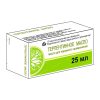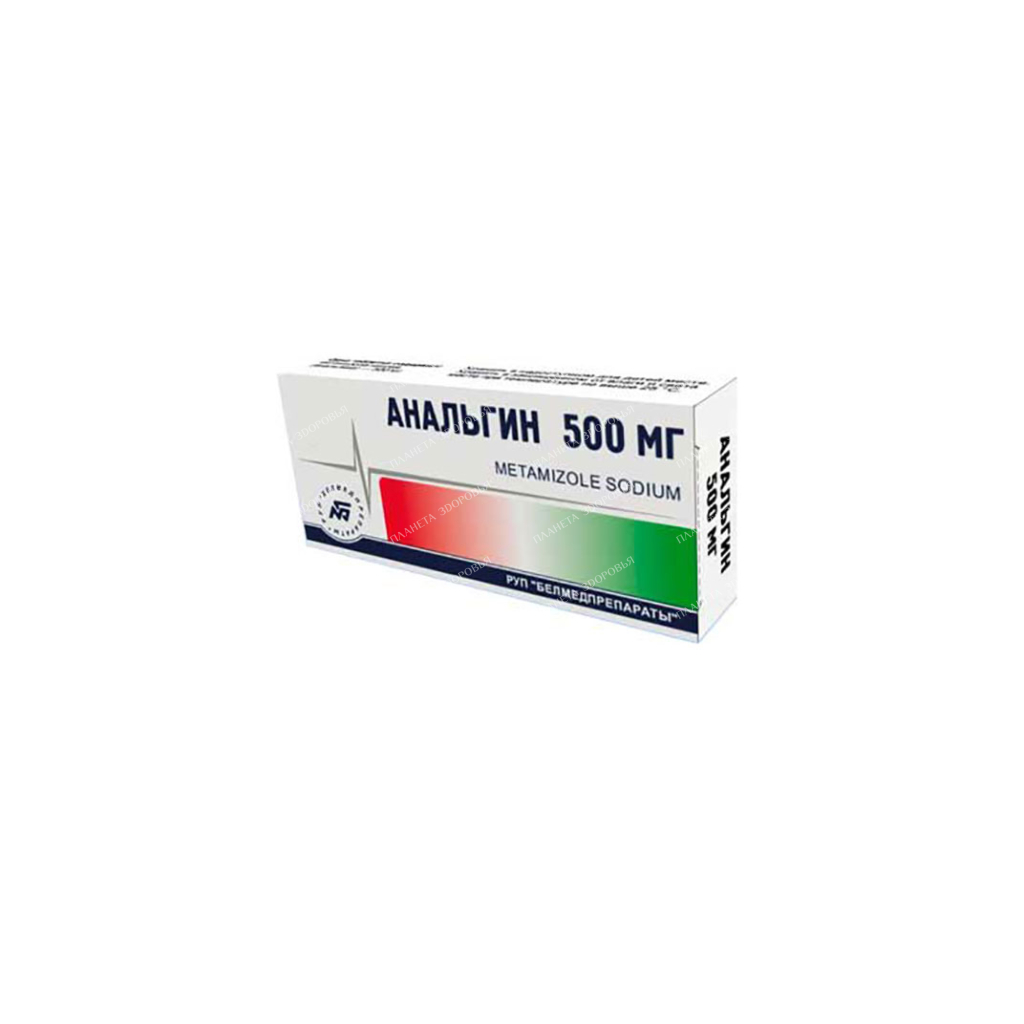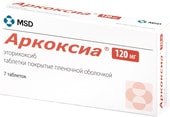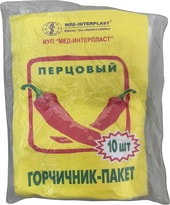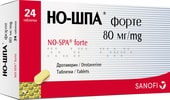Name:
Analgin.
Description:
Tablets are white or slightly yellowish, flat-cylindrical, scored on one side* and chamfered. * The notch is designed to divide the tablet to make it easier to swallow. The main active ingredient is Metamizole sodium. Release form Tablets. Dosage 500mg. Pharmacological action The drug contains metamizole sodium, which belongs to the group of non-steroidal anti-inflammatory drugs (pyrazolone or pyrazolidine derivatives) and has analgesic, antipyretic and moderate anti-inflammatory effects. Indications for use ANALGIN is used in adults and children from 10 years of age in the following cases: – acute pain after injury or surgery; – colic; – pain due to neoplasm; – other acute or chronic intense pain when other therapeutic measures are not possible; – high temperature, which does not respond to other measures. Parenteral administration is indicated only when enteral administration is not possible. If there is no improvement or you feel worse, you should consult a doctor. Dosage and Administration Always take this medicine exactly as directed by your healthcare professional. If in doubt, consult your doctor. Dosage regimen Dosage depends on the intensity of pain, fever and individual sensitivity in response to analgin. The lowest effective dose to control pain and fever should be chosen. The onset of action ranges from 30 to 60 minutes after oral administration and 30 minutes after parenteral administration. Adults and adolescents over 15 years of age (> 53 kg) can take up to 1000 mg per dose. In case of insufficient effect of a single dose, depending on the maximum daily dose, the maximum single dose can be taken up to 4 times a day. Single dose: 1-2 tablets (equivalent to 500-1000 mg metamizole sodium). Maximum daily dose: up to 8 tablets (equivalent to 4000 mg metamizole sodium). Special groups of patients Children In children, a sufficient dose of metamizole is 10 mg per kilogram of body weight to reduce temperature. For children over 10 years old and adolescents under the age of 14 years, a single dose of metamizole is 8-16 mg / kg. Single dose: 1 tablet (equivalent to 500 mg metamizole sodium). Maximum daily dose: up to 4 tablets (equivalent to 2000 mg metamizole sodium). Elderly patients In elderly patients, the dose should be reduced, since the excretion of metabolites may be slowed down when taking analgin. Patients with reduced renal function and impaired creatinine clearance In this category of patients, the dose should be reduced, since the excretion of metabolic products may be slowed down when taking metamizole. Patients with impaired renal or hepatic function High doses should be avoided in patients with impaired renal or hepatic function. Perhaps short-term use without dose reduction. Prolonged use is unacceptable. Route of administration The route of administration depends on the desired therapeutic effect and the condition of the patient. In many cases, oral administration is sufficient to achieve a satisfactory effect. For a rapid onset of effect, when oral or rectal administration is not possible, intravenous or intramuscular administration is recommended. When choosing the route of administration, it is important to remember that parenteral administration of drugs is associated with an increased risk of anaphylactic or anaphylactoid reactions. Tablets of 500 mg should be taken with a sufficient amount of liquid (for example, a glass of water). duration of treatment. The duration of treatment depends on the type and severity of the disease. Long-term treatment requires regular blood tests, including a differentiated white blood cell count. If you have any questions about the use of the drug, contact your doctor. If you forget to take a dose of the drug If you forget to take a dose, take it as soon as possible. Do not take a double dose to make up for a forgotten one. If you have missed several doses or have any additional questions about taking ANALGIN, tell your doctor. Use during pregnancy and lactation If you are pregnant or breastfeeding, think you may be pregnant, or plan to become pregnant, consult your doctor before using the drug. There are no sufficient data on the safety of the drug ANALGIN for pregnant women. The use of the drug ANALGIN during breastfeeding is not recommended. In rare cases, you may breastfeed for up to 48 hours after taking ANALGIN. If you have expressed breast milk during this time, discard this milk and do not give it to your baby. Driving and working with mechanisms Taking the recommended doses of the drug ANALGIN does not affect the ability to drive vehicles and work with mechanisms. As a precautionary measure, driving machines, vehicles, or other hazardous activities while taking high doses should be avoided. Precautions Before using the drug ANALGIN, consult your doctor. ANALGIN contains a pyrazolone derivative, metamizole, which can lead to a rare but life-threatening shock (sudden circulatory arrest) and agranulocytosis (a disease characterized by a decrease in certain white blood cells in the blood). If you develop hypersensitivity (anaphylactic reactions) to ANALGIN, you are at risk of reacting to other pain medications as well. If you experience allergic or other protective (immunologically mediated) reactions (eg agranulocytosis) to ANALGIN, you are at risk of reacting to other pyrazolones and pyrazolidines (chemically related substances) as well. If you experience symptoms of agranulocytosis, pancytopenia or thrombocytopenia, stop using ANALGIN immediately and seek medical attention immediately (see section “Possible adverse reactions”). Severe hypersensitivity reactions (anaphylactoid and anaphylactic reactions) You are at risk of developing hypersensitivity reactions to ANALGIN if you have ever experienced the following signs of intolerance: – aspirin asthma or analgesic intolerance syndrome in the form of angioedema; – attacks from the respiratory system (bronchial asthma), especially with concomitant inflammation of the nasal mucosa and paranasal sinuses (rhinosinusitis) and nasal polyps; – chronic urticaria; – intolerance to dyes (eg tartrazine) and preservatives (eg benzoates); – alcohol intolerance. This group of patients may react to even small amounts of alcoholic beverages with symptoms such as sneezing, watery eyes, and severe facial flushing. Such alcohol intolerance may be a sign of previously diagnosed asthma on analgesics. In patients with an increased risk of hypersensitivity reactions, it is necessary to prescribe ANALGIN only after a careful analysis of the benefit/risk ratio. If, nevertheless, the drug is prescribed, the patient should be under observation for medical care and readiness for emergency situations. Anaphylactic shock may develop in particularly sensitive patients (see section “Possible adverse reactions”). Therefore, special attention should be paid to patients with asthma or a predisposition to hypersensitivity reactions (atopy). Severe skin reactions Life-threatening skin reactions (Stevens-Johnson syndrome, toxic epidermal necrolysis) have been reported with the use of metamizole sodium. If you develop a skin rash, especially with blisters or mucosal lesions, STOP ANALGIN IMMEDIATELY and do not restart treatment. Decreased blood pressure ANALGIN may cause a decrease in blood pressure. The risk of this adverse reaction is increased if: if you have low blood pressure (hypotension), if you are dehydrated or dehydrated, if your circulation is unstable or is starting to fail (for example, a heart attack or a serious injury); if you have a high fever. To reduce the risk of hypotension it is necessary to determine the advisability of prescribing ANALGIN and, if the drug is prescribed, carefully monitor and, if necessary, take preventive measures (for example, stabilize blood circulation). If you need to avoid a decrease in blood pressure (for example, in case of severe coronary heart disease or narrowing of the lumen of blood vessels supplying the brain), ANALGIN should be used with careful monitoring of circulatory function. Patients with impaired renal or hepatic function If you have a liver or kidney disease, you should take ANALGIN after a careful analysis of the possible risks in relation to the expected benefits (see section “Use”). Elderly patients In elderly patients, the excretion of metamizole sodium metabolites may be slowed down. Children For children under 10 years of age, the use of the drug ANALGIN is contraindicated. Contraindications Do not take analgin if you are allergic to metamizole sodium or other pyrazolones (eg, phenazone, propyphenazone) or pyrazolidines (eg, phenylbutazone and oxyphenbutazone), including patients who have responded with a sharp decrease in white blood cells with these drugs; if you are allergic to metamizole or any of the components of the drug specified in the “Composition” section; if you know that you have intolerance to analgesic therapy (aspirin asthma or analgesic intolerance syndrome in the form of angioedema). This applies to patients with spastic narrowing of the airways (bronchospasm) or other symptoms of hypersensitivity such as itching, runny nose, edema (rhinitis, urticaria, angioedema) to pain medications (salicylates, paracetamol, diclofenac, ibuprofen, indomethacin or naproxen); if you have bone marrow dysfunction, for example, after treatment with cytotoxic drugs (drugs to treat cancer); if you have a congenital deficiency of glucose-6-phosphate dehydrogenase (a hereditary disease with a risk of breakdown of red blood cells); if you have upper blood pressure below 100 mm Hg. Art.; if you have intermittent hepatic porphyria (a hereditary disease with impaired blood pigmentation); if you are in the third trimester of pregnancy; if you are breastfeeding; if you are a child under 10 years old. If any of the above applies to you, tell your doctor and stop taking ANALGIN. The active substance of the drug ANALGIN is metamizole sodium (analgin). Excipients are calcium stearate, white sugar (in the form of powdered sugar), talc, potato starch. Overdose Overdose symptoms: nausea; vomit; abdominal pain; limitation of kidney function / acute renal failure (for example, against the background of interstitial nephritis); dizziness; drowsiness; loss of consciousness; convulsions; a sharp decrease in blood pressure up to shock; arrhythmia (tachycardia). If you think that you have received too much ANALGIN, tell your doctor so that he can take appropriate measures. Note: in the case of high doses of ANALGIN, urine may be stained red due to the excretion of a safe metabolite of metamizole sodium (rubazonic acid). Side effects If you forget to take a dose of the drug If you forget to take a dose, take it as soon as possible. Do not take a double dose to make up for a forgotten one. If you have missed several doses or have any additional questions about taking ANALGIN, tell your doctor. Storage conditions Keep the drug out of the reach and sight of children. Store the drug in a place protected from moisture and light at a temperature not exceeding 25 ° C. Keep the drug in its original packaging. Do not use the drug after the expiration date indicated on the package. The expiry date is the last day of the month. Shelf life: 5 years. Do not use the drug if you notice that the cell in which the tablet is located is damaged. Do not dispose of the drug down the drain. Ask your pharmacist how to dispose of drugs you no longer need. These measures will help protect the environment. Buy Analgin tablets 500mg No. 10×2 Price for Analgin tablets 500mg No. 10×2
| INN | METAMIZOL SODIUM |
|---|---|
| The code | 33 915 |
| Barcode | 4 811 098 002 083 |
| Dosage | 500mg |
| Active substance | Metamizole sodium |
| Manufacturer | Belmedpreparaty RUE, Belarus |
Related products
Pain Relief & Anti-Inflammatories
Pharmaceutical technology Naysulide powder, 100 mg, 10 Pak. 2 g each
Pain Relief & Anti-Inflammatories
Pain Relief & Anti-Inflammatories
 Free worldwide shipping on orders $99+
Free worldwide shipping on orders $99+  US: temporary delays — postal services aligning new import rules,
US: temporary delays — postal services aligning new import rules,  EU: 1–2 weeks,
EU: 1–2 weeks,  Worldwide: 1–4 weeks
Worldwide: 1–4 weeks 


